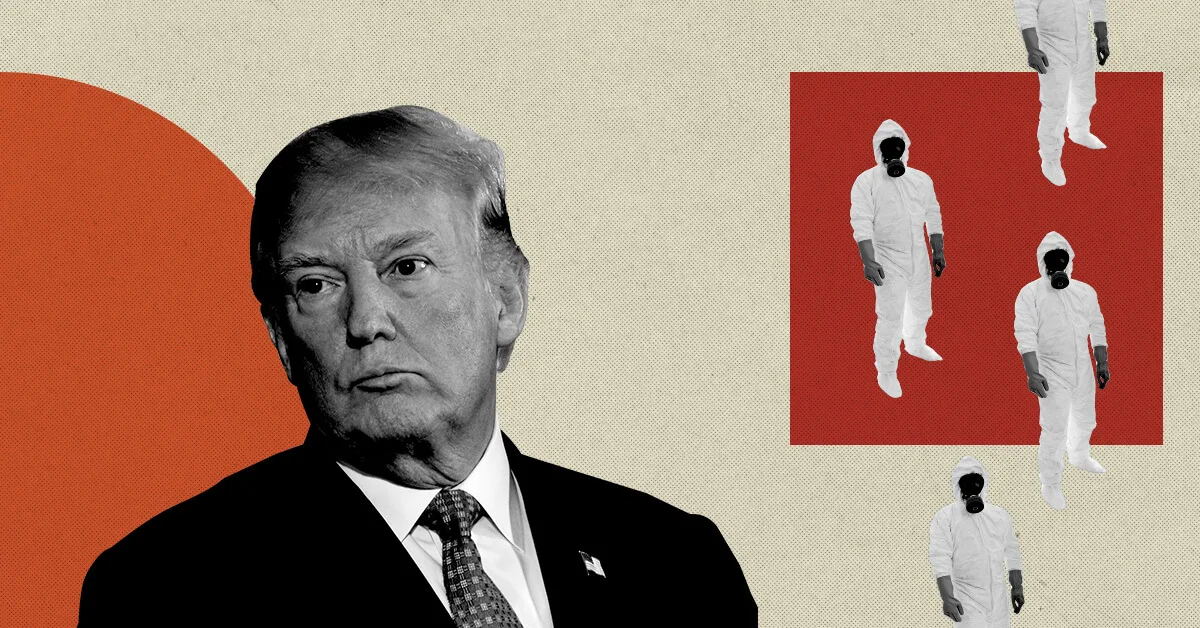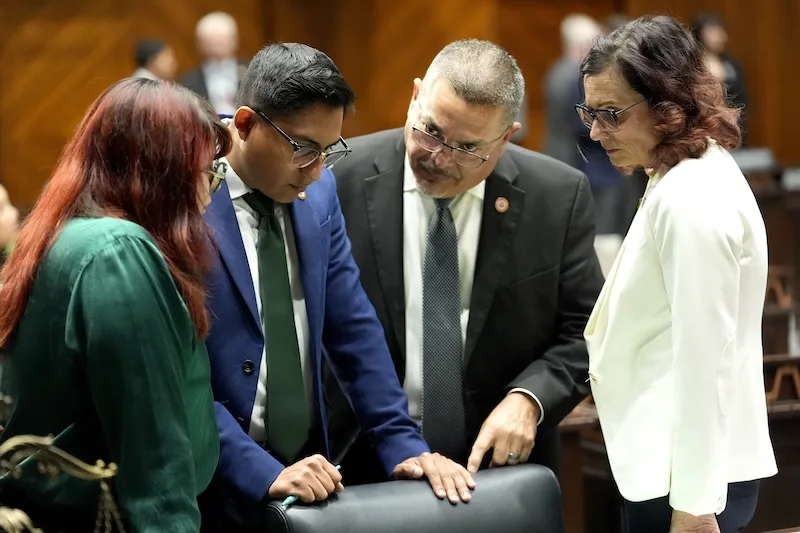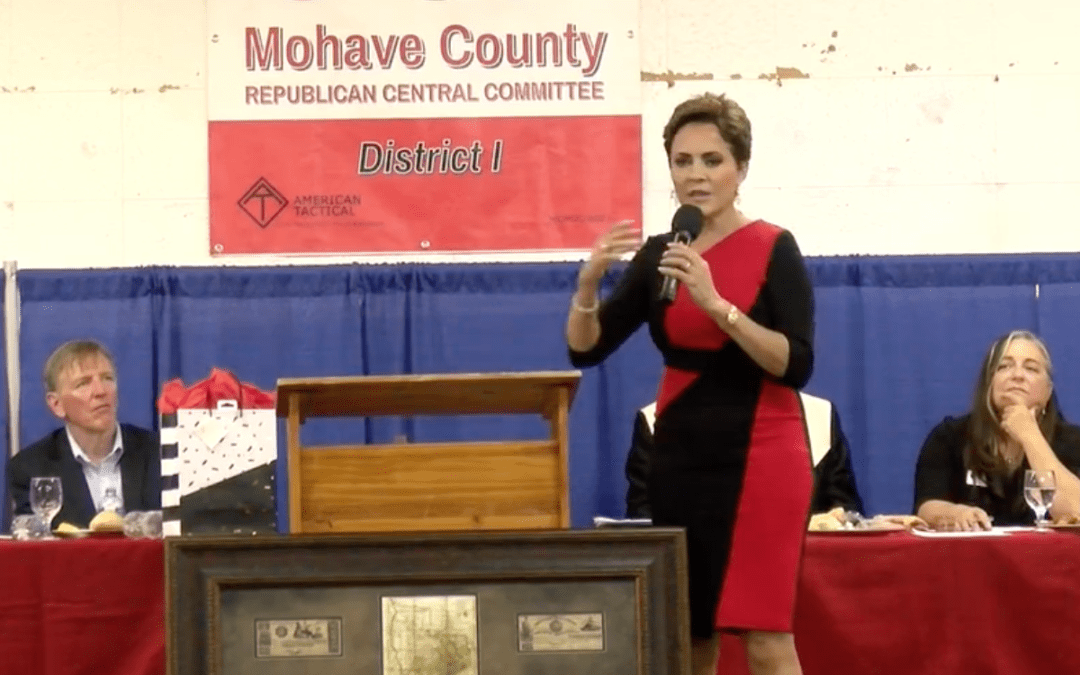
While Sen. Kyrsten Sinema and Arizona’s House Members align in message over coronavirus relief for Arizona’s tribal residents, Sen. McSally has opted for a different approach.
Arizona’s congressional delegation has called for federal aid to help minimize the impact of the coronavirus to help Arizona’s Tribal nations, but locals say the state’s junior senator has stalled in response.
A longtime supporter of President Donald Trump, Republican Sen. Martha McSally has largely followed his lead in approaching the spread of COVID-19 in the US. Most recently, she has focused her efforts on placing blame for the virus on China, and called on the director of the World Health Organization to step down from his role.
These efforts are both talking points now used regularly by Republican lawmakers to shift blame for Trump’s missteps during the onset of the outbreak.
However, at a time when Gov. Doug Ducey has declared a state national emergency and Arizona’s Tribal nations have been hit hard by the coronavirus, many lawmakers say federal aid is imperative to dealing with the state’s shortfalls.
The Navajo Nation alone has more than 400 cases of the virus, resulting in 17 deaths. Concerns over the states indigenous population led Arizona’s nine members of the House of Representatives to write a joint letter, urging the federal government to provide tribal lands with aid as quickly as possible.
“Our country is waging a war with this new virus, and we need to ensure no community is left behind without the resources they need in that fight,” the letter reads. “This is true of all our communities, including Tribal Nations, who are uniquely vulnerable to this health and economic crisis.”
The letter outlines the need to provide the state’s 22 federally recognized tribes with the $10 billion allotted to the state in the coronavirus aid package as quickly as possible.
Tribes have independently been lobbying Congress to ensure the federal government fulfills its obligation to them under various treaties, including relief during national emergencies. While the $10 billion for tribes in the $2.2 trillion coronavirus package is less than they requested, tribes say it represents progress.
Some healthcare clinics have closed and hospitals that serve Native Americans have scaled back services to focus on the coronavirus. Like the rest of the country, they’re facing severe shortages in supplies like masks, gowns, and nasal swabs. Tribes and tribal organizations had asked Congress to fund more equipment, more medical providers, and temporary housing.
Tribes will also be eligible for federal loans to help pay tribal employees. Many have shut down casinos and tourism operations that serve as major sources of revenue for tribal communities.
The Senate bill didn’t initially have much for tribes, but negotiations between Democrats and Republicans led to the $10 billion — $8 billion of which will help reimburse tribes for coronavirus-related expenses they’ve already incurred. The original $1 trillion relief bill, introduced by Republican Senate Majority Leader Mitch McConnell had nothing set aside for the country’s indigenous population.
In an interview with the Huffington Post, Democratic aides said GOP leaders were not interested in providing tribes with assistance.
“Tribes were an afterthought,” said one of the aides. “The White House and Republicans would have been satisfied with zero.”
McSally spokeswoman Amy Lawrence said the senator’s involvement in leaving tribes out of the package was nonexistent. But McSally voted in favor of McConnell’s original proposal, once again in lockstep with the Trump Administration.
The move did not go unnoticed by Arizona Republic columnist Laurie Roberts, who wrote that, while the impact of the coronavirus has changed so much in the world, one thing remains constant: McSally’s unwavering dedication to Trump.
“Sen. Martha McSally is still reprising her role as chief cheerleader to President Donald Trump,” Arizona Republic columnist Laurie Roberts wrote in a scathing editorial. “In fact, she seems to have quarantined herself smack inside the president’s pocket.”
“If there’s anything positive to say out of this, it’s people will learn a lot,” said Robert Anderson, a visiting law professor at Harvard University and a member of the Bois Forte Band of the Minnesota Chippewa Tribe. “When an emergency comes up, what do we do to make sure Congress thinks about Indian Country, and there’s equity in these bailouts.”
According to New Mexico U.S. Sen. Tom Udall’s office, the $8 billion in the latest relief fund will be distributed by the Treasury Department. The $40 million earmarked for tribes in the earlier package is being distributed through a grant program under the Centers for Disease Control.
In her push to expedite relief to Arizona’s tribes, Sen. Kyrsten Sinema asked the Federal Emergency Management Agency to waive its share of costs for services on the Navajo Nation.
“The Navajo Nation and Tribal communities across Arizona are battling outbreaks of the coronavirus and need every available resource,” Sinema said in a written statement to The Arizona Republic. “We’re working to connect the Navajo Nation to testing and (personal protection equipment), pushing the federal government to allow Tribes to apply directly for emergency funding, and are urging the federal government to consult directly with Tribes to ensure tribal communities have the resources they need to fight coronavirus.”
Other provisions of the bill signed Friday allow tribes to be reimbursed for some unemployment benefits, and to access more funding for housing. The U.S. Bureau of Indian Affairs will receive more than $450 million to support teleworking and overtime costs, welfare assistance, and social service programs – and to expand public safety and emergency response.
Money also is going to help child care providers, and to pay for staffing, transportation, and cleaning at Bureau of Indian Education schools and tribal colleges.
But the delayed dispersement of the funds has caused tribal leaders to become frustrated with the federal government. In an emergency call with Arizona’s congressional delegation on Wednesday, leaders from the Inter Tribal Association of Arizona urged Congress to release the funds as quickly as possible.
“Tribal leaders in Arizona are deeply concerned with the lack of clarity and slow action of the federal government in providing access to both the Paycheck Protection Program (PPP) and the $8 Billion in Tribal assistance funds provided by Congress under the CARES Act.,” said Shan Lewis, Vice Chairman of the Fort Mojave Indian Tribe and ITAA President. “Tribal governments urgently need support for their COVID-19 response now, not in days or weeks.”
Sinema, who hosted the call, agreed with Lewis, adding that the outbreaks in tribal communities will worsen until the federal government steps in.
“Tribal communities across Arizona are experiencing dangerous outbreaks of the coronavirus pandemic,” Sinema said. “Federal leaders must work with Tribes to ensure they have the health resources and economic support needed to fight the coronavirus outbreak consistent with the federal government’s trust and responsibilities and respect for Tribal sovereignty.”
To combat the spread of coronavirus among tribal communities, the Centers for Disease Control and Prevention has announced it will provide an additional $80 million to help tribal leaders fight the spread. However, these funds also have yet to be distributed.
Politics

Democrats clear path to bring proposed repeal of Arizona’s near-total abortion ban to a vote
Democrats in the Arizona Senate cleared a path to bring a proposed repeal of the state's near-total ban on abortions to a vote after the state's...

It’s official: Your boss has to give you time off to recover from childbirth or get an abortion
Originally published by The 19th In what could be a groundbreaking shift in American workplaces, most employees across the country will now have...
Local News

Kari Lake calls on Arizona county sheriffs to enforce 1864 abortion ban
Republican candidate for US Senate Kari Lake on Saturday seemed to solidify her support for Arizona’s total abortion ban and called on county...

Where to buy farm-fresh eggs in Tucson
Once you’ve tasted farm-fresh eggs, it’s hard to go back to the store-bought variety. Not only do farm-fresh eggs taste better and have...





